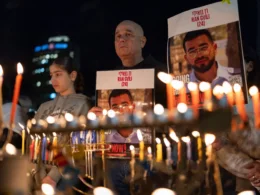Following Hamas’s terrorist attack against Israel in October, Hezbollah, or "The Party of God," an Iran-backed Shiite Lebanese terrorist group, has joined in the conflict, attempting to open a second front against Israel.
But who is Hezbollah?
Hezbollah emerged as a powerful political and military force in Lebanon. Following Israel's invasion of Lebanon in 1982 to expel the secular Palestinian Liberation Organization (PLO), members of the Islamic Revolutionary Guards Corps (IRGC) were sent to Lebanon to work with the country's Shiite community to push Israel out of Beirut.
In the city of Tyre, Hezbollah, with support from Tehran, employed suicide bombings via car bombs against Israeli forces, leading to shocking and devastating losses. The group later bombed the United Staes embassy and Marine barracks through truck bombs, shocking the international community. As a result of the group's actions, the US government pulled all military forces out of Lebanon, granting Iran and Hezbollah a political victory.
As Lebanon's Shiite community grew more and more supportive of Hezbollah, the IRCG began expanding its operations in Southern Lebanon, assisting with the group's official creation in 1985. The newly-created Iran proxy vowed to resist Israeli occupation and champion the rights of Lebanon's Shiite population.
In the early years of Hezbollah, the terrorist group experienced internal leadership struggles, notably Sheikh Subhi Tufayli's role, which did not fully align with the viewpoint of entering Lebanese elections, leading to his removal in 1991.
Following Tufayli's push out of Hezbollah, Sheikh Abbas al-Musawi became the group's newest leader but was neutralized by an Israeli airstrike in 1992. Soon after, a young religious sheikh by the name of Hassan Nasrallah became the organization's general secretary, relying heavily on the Islamic Republic of Iran for structural and military support.
Central to Hezbollah's mission has been its unwavering support from the Islamic Republic of Iran.
Following the Islamic Revolution of 1979, where the then-Ayatollah Ruhollah Khomeini overthrew the US-backed Iranian monarchy, Tehran has provided Hezbollah with ideological, financial, and military backing.
Reports indicate that Iran has supplied the group with substantial weaponry, including hundreds of thousands of rockets, enhancing Hezbollah's military capabilities significantly against Israel, the Sunni Arab states, and American forces.
Under the leadership of Sheikh Hassan Nasrallah since 1992, Hezbollah has navigated the delicate balance between political engagement and military prowess. Participating actively in Lebanese politics, the organization has secured seats and formed alliances, wielding influence in the country's government.
Simultaneously, Hezbollah has maintained a robust military wing, engaging in conflicts like the 2006 Lebanon War, where its formidable arsenal of rockets and military infrastructure resulted in its survival against Israel’s military.
Hezbollah's role as an official political entity and a military force has stirred controversy, especially considering the group's significant military capabilities. The organization's engagement in regional conflicts, including its support for the Assad regime in the Syrian Civil War, has triggered internal dissent within Lebanon and the Arab world.
Outside of Lebanon's borders, Hezbollah's role has strengthened with its alignment with Tehran in recent decades. In Latin America, specifically Argentina, Columbia, Brazil, Paraguay, and Bolivia, Hezbollah has established various sleeper cells via its mosque networks, engaging in drug smuggling, weapons smuggling, and human trafficking.
According to reports, the Islamic Republic has provided the group with substantial military aid, including rockets, military training, and drone technology. Hezbollah officials ranging from Nasrallah to military commanders are in constant communication with the Iranian Supreme Leader and the Quds Force, coordinating attacks against Israel and American forces in the Middle East region.
Related Story: Lebanese Lawmaker and Hezbollah Member Says Organization Directly Supervising War Against Israel









